- News
- Reviews
- Bikes
- Components
- Bar tape & grips
- Bottom brackets
- Brake & gear cables
- Brake & STI levers
- Brake pads & spares
- Brakes
- Cassettes & freewheels
- Chains
- Chainsets & chainrings
- Derailleurs - front
- Derailleurs - rear
- Forks
- Gear levers & shifters
- Groupsets
- Handlebars & extensions
- Headsets
- Hubs
- Inner tubes
- Pedals
- Quick releases & skewers
- Saddles
- Seatposts
- Stems
- Wheels
- Tyres
- Tubeless valves
- Accessories
- Accessories - misc
- Computer mounts
- Bags
- Bar ends
- Bike bags & cases
- Bottle cages
- Bottles
- Cameras
- Car racks
- Child seats
- Computers
- Glasses
- GPS units
- Helmets
- Lights - front
- Lights - rear
- Lights - sets
- Locks
- Mirrors
- Mudguards
- Racks
- Pumps & CO2 inflators
- Puncture kits
- Reflectives
- Smart watches
- Stands and racks
- Trailers
- Clothing
- Health, fitness and nutrition
- Tools and workshop
- Miscellaneous
- Buyers Guides
- Features
- Forum
- Recommends
- Podcast
review
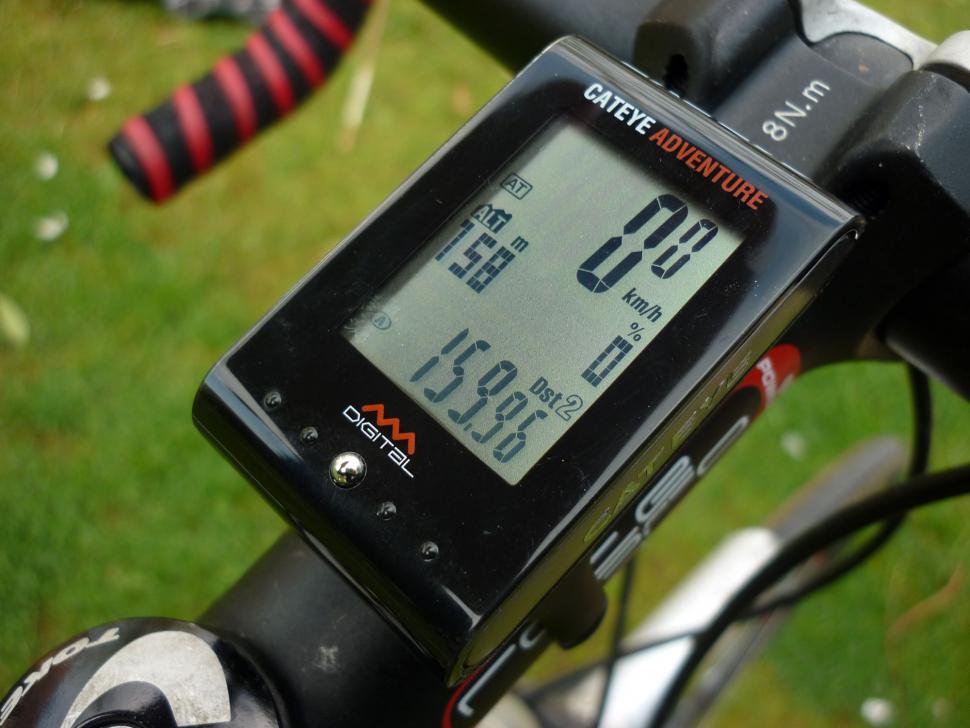 Cateye Adventure wireless altimeter cycle computer
Cateye Adventure wireless altimeter cycle computer£99.99
VERDICT:
Well made, easy to use cycle computer with good range of useful functions
Weight:
49g
Contact:
www.zyro.co.uk
At road.cc every product is thoroughly tested for as long as it takes to get a proper insight into how well it works. Our reviewers are experienced cyclists that we trust to be objective. While we strive to ensure that opinions expressed are backed up by facts, reviews are by their nature an informed opinion, not a definitive verdict. We don't intentionally try to break anything (except locks) but we do try to look for weak points in any design. The overall score is not just an average of the other scores: it reflects both a product's function and value – with value determined by how a product compares with items of similar spec, quality, and price.
What the road.cc scores meanGood scores are more common than bad, because fortunately good products are more common than bad.
- Exceptional
- Excellent
- Very Good
- Good
- Quite good
- Average
- Not so good
- Poor
- Bad
- Appalling
Cateye's Adventure computer occupies the middle ground between basic units and the more involved, data-downloadable computers at the high end. For your hundred quid you get a well made, easy-to use bit of kit that adds a few useful features to the standard set.
Setting up the Adventure is a pretty simple process, just follow the step-by-step instructions in the leaflet and you're up and running in about five minutes. The one thing to note is that the Click-Tec™ Plus button – you can basically press any part of the face – is in reality a small switch on the rear that only becomes easy to use once the unit is mounted, so you'll need a bit of dexterity. The mount itself is one of Cateye's plastic Jubilee clip affairs that you can attach to your bars or stem, and it's the usual zipties and thumbscrew for the sensor and magnet. The sensor needs to be paired with the head unit, which takes about a minute and ensures trouble-free communication.
Once everything's in place the Adventure, which is small and classy-looking, is great to use. Mine has performed flawlessly throughout testing and has been unfazed by sportive traffic, overhead wires and LED flashers. The screen is split into three rows. At the top there's your speed, writ large, and underneath that there's a dot matrix row that concerns itself with altitude and gradient. At the bottom are all the other functions: trip distance, average and max speeds, odometer, clock, elapsed time and so forth. Their indicators are a bit small and hard to read until you get to know the sequence, but it's not a big deal. Scrolling through the functions and resetting the computer is a piece of cake thanks to the fact that you just click anywhere on the face; there's a small secondary button that's used for accessing some data. Useful features that you don't often find include a countdown distance timer and the ability to toggle auto-stop on the clocks, which is handy for timed events.
The main draw of the Adventure is its pressure-based altimeter and temperature sensors. I've used a lot of barometric altimeters and most of them are very good; this one is no exception. You need to set your altitude at a known point to get a reference, but after that it's pretty much spot on. Obviously air pressure varies during the day and that will affect the readings, but it's unusual to arrive home to find the altitude more than five metres different than when you started. Gradient updates every few seconds and is accurate to 1% on the climbs whose gradients I've measured.
And is it useful? Yes, or at least I find it so, especially when I'm riding somewhere different. I took the Adventure on the Forest of Dean Classic sportive and it's very handy to be able to look down and get an instant reference of your altitude, there's far fewer shocks along the way. If it seems like you've been climbing for ages and the needle's only just crept above 100m, you know there's going to be more to come. Similarly, you can track your descending and judge from how low you go how hard the next climb will be. On long flat bits that are hard work you can instantly see whether they really are flat or not thanks to the gradient readout. The Adventure gives you a full tally of metres gained and lost, which is a good number to bandy about at the end of a long ride.
Temperature I find less useful – my fingers always tell me how cold I am anyway – but the two seem to be intrinsically linked, you never get one without the other. Anyway, it can be interesting, more so in the winter when it can warn of unexpected ice patches.
Verdict
If you're spending a hundred quid on a standalone computer you'll want something that provides you with a good range of data and is well made and easy to use. The Adventure scores well on all points, and it's a good all-rounder.
road.cc test report
Make and model: Cateye Adventure Wireless Altimeter computer
Size tested: n/a
Tell us what the product is for, and who it's aimed at. What do the manufacturers say about it? How does that compare to your own feelings about it?
Designed for use on and off-road, the new 14 function, 14 feature Cateye Adventure Wireless is an Altimeter and cycle computer in one. With Cateye’s accurate cycle functions on board, the Adventure Wireless gives additional Current Altitiude, Trip Altiude, Gradient and Total Altitude Gain as well as Temperature. Giving you, the user, an extra dimension to your ride or race readout! The altitude can be set from home for each ride or programmable if you’re starting elsewhere.The Adventure Wireless features digital signal for reduced interference and the new Click-Tec™ Plus button for easy interface.
Tell us some more about the technical aspects of the product?
Functions:
- Sea level altitude
- Ascending Altitude
- Total altitude gain
- Slope
- Temperature
- Current, average & Maximum speed
- Trip distance
- Trip distance 2
- Odometer
- Countdown distance
- Elapsed time
- Clock
Features:
- Digital wireless system (ID coded)
- Programmable reference altitude, home altitude & total distance
- Dual tire size
- Automatic 2nd bike sensor recognition
- ClickTec Plus™
- New FlexTight™ bracket
- Pace arrow - Auto or manual start/stop
- Low battery indicator (computer & sensor)
- Auto power-saving mode
- Sleep mode
Specifications:
Fits almost any handlebar or stem: 22-31.8mm
Fits almost any fork: 11-55mm
Batteries: CR2032 x 2 (1 each for head unit and sensor)
Front fork speed sensor
Transmission distance up to 70cm - 27 inches
Rate the product for quality of construction:
8/10
Well made, very simple to fit
Rate the product for performance:
9/10
Faultless communication between the sensor and head unit. Some of the data headings are a bit fiddly though
Rate the product for durability:
8/10
Has kept its good looks thus far, bucket test reveals it's well sealed
Rate the product for weight, if applicable:
9/10
You're not going to notice a computer, now are you?
Rate the product for value:
7/10
Not cheap at a hundred quid but well made and the extra functions are useful
Tell us how the product performed overall when used for its designed purpose
Very well
Tell us what you particularly liked about the product
Accurate and easy to use
Tell us what you particularly disliked about the product
Fiddly data headings
Did you enjoy using the product? Yes
Would you consider buying the product? Yes
Would you recommend the product to a friend? Yes
About the tester
Age: 37 Height: 190cm Weight: 96kg
I usually ride: whatever I\\\'m testing... My best bike is: Genesis Equilibrium with Ultegra 6700
I've been riding for: 10-20 years I ride: Every day I would class myself as: Experienced
I regularly do the following types of riding: time trialling, cyclo cross, commuting, sportives, general fitness riding, fixed/singlespeed, mtb, Mountain Bike Bog Snorkelling, track
Dave is a founding father of road.cc, having previously worked on Cycling Plus and What Mountain Bike magazines back in the day. He also writes about e-bikes for our sister publication ebiketips. He's won three mountain bike bog snorkelling World Championships, and races at the back of the third cats.
Latest Comments
- Destroyer666 18 min 1 sec ago
Have you owned Bont shoes? In my experience even the widest Lake shoes have had a bizarre form of narrowing way too much in the toe area. But the...
- froze 45 min 41 sec ago
Not sure if this is possible, but this news letter goes out all over the world, and some places like Decathlon does not send stuff to America, in...
- Hirsute 1 hour 30 min ago
I'm confused as to why you'd need bib shorts indoors.
- Hirsute 1 hour 31 min ago
Does that mean anyone can nick it ?! Says 2 sensors- one on the crank? Ok, I'm pedalling but how fast ?
- Oldfatgit 1 hour 59 min ago
I'm sure you were being sarcastic... however ... Lewis Hamilton lives in Monaco. Yet another car driver that doesn't pay any tax
- chrisonabike 3 hours 37 min ago
Of course ... but the current logic seems to favour "I have bought it so therefore it is my right to use it. If I'm not supposed to it shouldn't...
- BikingBud 4 hours 11 min ago
Paddington Harrow Road crash leaves two seriously injured...
- TheBillder 7 hours 37 min ago
I've had (past tense is deliberate) 3 of these over the past 5 years. I'm back here researching for a replacement as my last one broke last week. I...
- chrisonabike 9 hours 38 min ago
And the next time - plead sympathy for your addiction, caused by trauma from your previous "accident"...
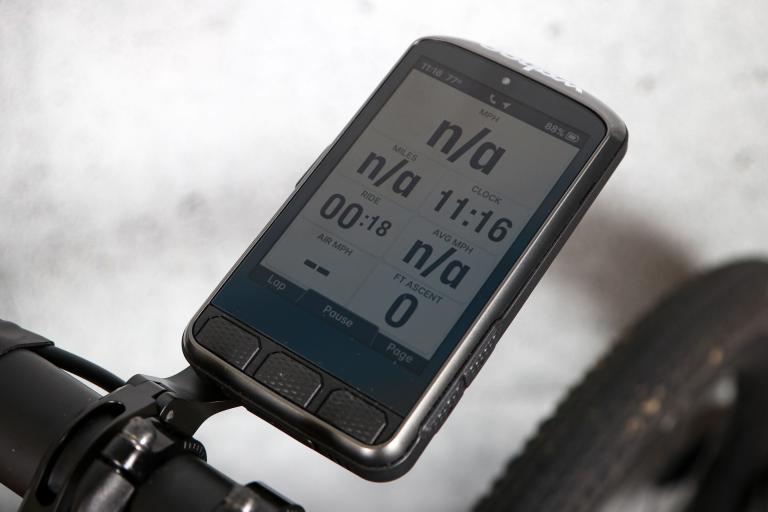
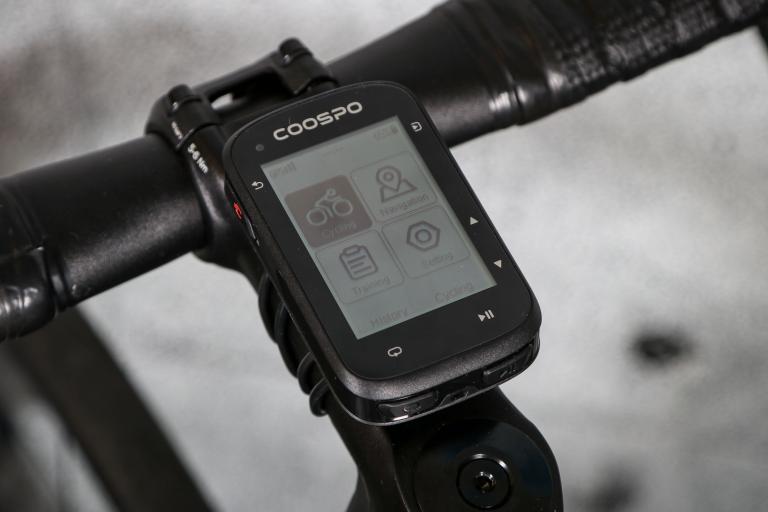
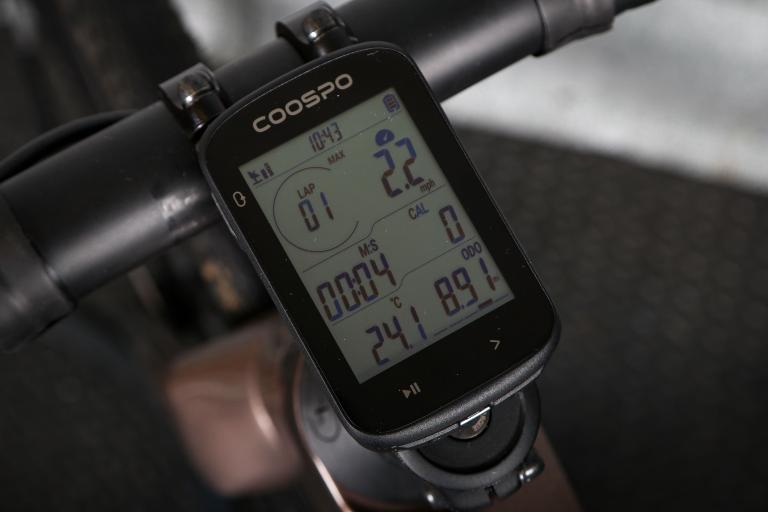
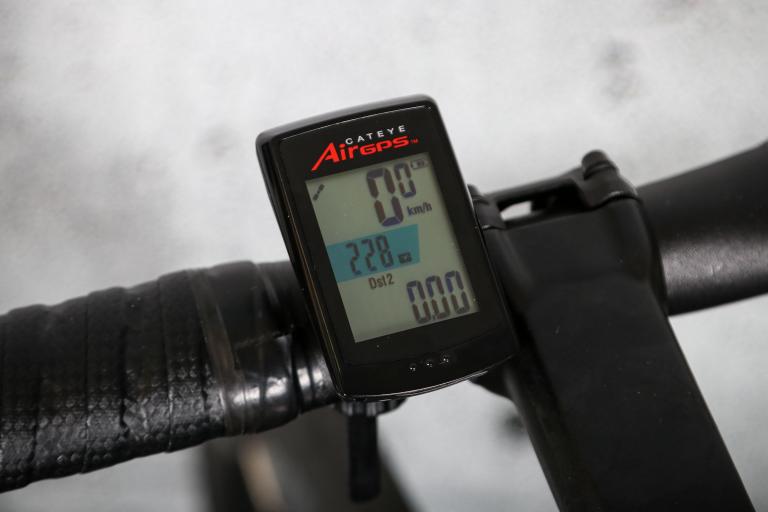
Add new comment
1 comments
I cycled from Kent to the east of Torino 2 years ago, it performed really well.I had already noted easily identified altitudes along the way from Google Earth. I had to change the sensor battery at the Swisse end of the Grand St Bernard, and reset the altitude and it was dead on ar 2470m at the top.
It is really usefull on long climbs (GSB is 40km), as you can track your progress.
I have two, it is a shame it is now not available.